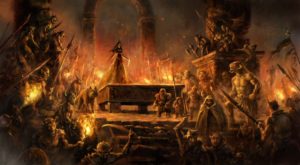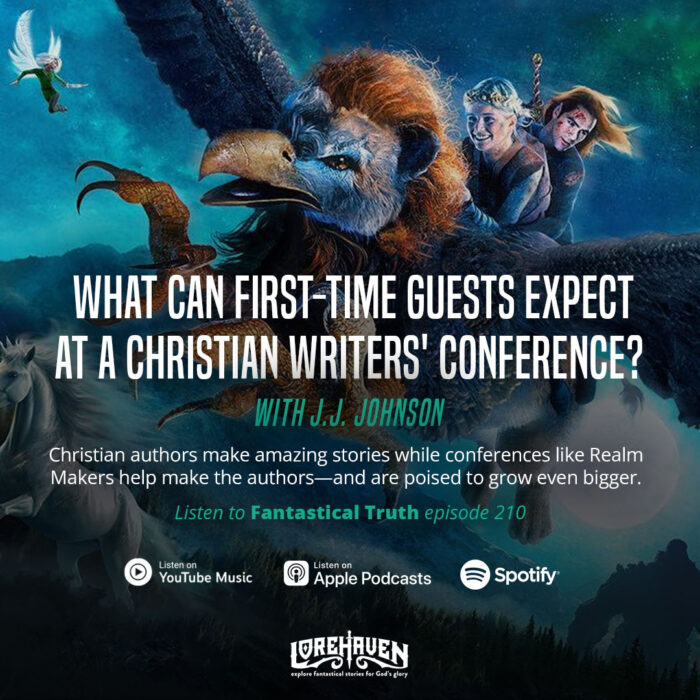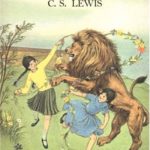Does Narnia “Rewrite” Christianity?
Interestingly Christianity recently came into the spotlight of a major fantasy outlet, and not necessarily in a good way, but let me explain.
This week we celebrate Thanksgiving here in the US. Also occurring this week is the 55-year anniversary of C. S. Lewis’s death, although the western world does not set aside the day as a holiday. In many respects, the two days converge for me. I am thankful for C. S. Lewis and specifically for his fantasy series, The Chronicles of Narnia, not only because the stories are compelling, not only because they pried open the door of fantasy for me, but because they showed me that I wanted to write fantasy too and they showed me the way I wanted to write, incorporating God’s truth into story in a natural way.
While I love Narnia, I’m not unaware that some people, both critics and fans, see Lewis as taking a left turn away from orthodox Christianity in these stories. The latest writer to take that position is Leah Schnelbach in an article in Tor.com entitled “Moral Kombat: How Narnia and Harry Potter Wrestle with Death and Rewrite Christianity.” It’s a lengthy analysis comparing and contrasting two of the most influential fantasy works of the last sixty years.
Schnelbach explains the “rewriting Christianity” concept this way:
When the series culminates in The Last Battle, it’s revealed that faith in Narnia/Aslan has allowed all the “Friends of Narnia” to return (and that Susan’s lack of such faith left her on Earth), and that all “good” followers of Tash get to come along to a Heaven that is sort of a deluxe Narnia: “I take to me the services which thou hast done to Tash… if any man swear by him and keep his oath for the oath’s sake, it is by me that he has truly sworn, though he know it not, and it is I who reward him.”
In this way Lewis creates a stand-in messiah, twines the quasi-Jesus story around the core of his fantasy series, and riffs respectfully on Christian theology. He takes the somewhat liberal (and controversial, in some theological circles) Inclusivist stance that good works can get people into paradise apart from their conscious faith in his specific savior figure.
As it happens, E. Stephen Burnett addressed this criticism of Lewis’s theology some years ago in a short series entitled Refuting ‘universalist’ slanders of C.S. Lewis He builds a strong case that Lewis’s fantasies are not to be feared as heretical or “rewrites” of Christianity. In the second article in his series, Stephen specifically addressed the scene from The Last Battle that Schnelbach referenced.
Whether reading Lewis’s nonfiction or his fiction, we must stay mindful of the whole picture, following the genre’s rules.
This applies when answering this common accusation about Lewis’s beliefs: Lewis believed universalism, because in The Last Battle, a pagan character goes to heaven. (emphases in the original)
Someone schooled in Lewis’s understanding of how to write fantasy knows that he did not intend to write a “stand-in Messiah” in the way that Schnelbach understands it. He was not writing allegory. Rather, he termed his approach to fantasy as “supposal.” Lewis implied that he came to his stories by asking, How would Christ look and act and live in this imagined world? Meaning, that He most definitely would not be the same in a world with talking animals as He is in our real world.
 The stone table, for instance, is not a cross, and Aslan didn’t stay in a tomb for three days and nights. Is Lewis heretically claiming that what the Bible said about Christ’s crucifixion and resurrection is wrong? Clearly not. He was relating the truth of salvation by supposing what it might look like in a pretend world. This most certainly is not the same as “rewriting Christianity.”
The stone table, for instance, is not a cross, and Aslan didn’t stay in a tomb for three days and nights. Is Lewis heretically claiming that what the Bible said about Christ’s crucifixion and resurrection is wrong? Clearly not. He was relating the truth of salvation by supposing what it might look like in a pretend world. This most certainly is not the same as “rewriting Christianity.”
When something like Schnelbach’s article comes out, especially from a reputable fantasy source such as Tor, I suspect a number of readers have digested this idea that misrepresents Lewis’s views. Many may have even embraced it, so I think it’s imperative to take a stand against such an understanding that undermines a man known for his Christian worldview. And for his many fiction and non-fiction books that deal with Christianity.
If we Christians who read and love speculative literature don’t stand up for one of the greats in our genre, who will?
No, Lewis was not perfect. Everything he wrote or believed doesn’t completely agree with my understanding of the Bible. But he was not undermining Christianity with his fantasy.
In part he was working out his thoughts and beliefs in every book, as every writer does. And like all other writers, his ideas did not remain static. After his wife died, his understanding of suffering did deepen, for instance.
 But in his fantasy Lewis never intended to write a theological treatise. Consequently, reading the stories as if they express his views about God and heaven and salvation in our real world is not accurate. Yes, Lewis believed in God who created the world, who saved the world, who made a way for those who believed to go “further up and further in.”
But in his fantasy Lewis never intended to write a theological treatise. Consequently, reading the stories as if they express his views about God and heaven and salvation in our real world is not accurate. Yes, Lewis believed in God who created the world, who saved the world, who made a way for those who believed to go “further up and further in.”
The specifics, the ways in which the world of Narnia differs from Christianity, are more obviously explained by the fact that Lewis was not writing allegory.
On one hand, secularists criticize Lewis for writing Christianity into his books (and in this case, for writing his own version of Christianity), but on the other hand too many Christians criticize him for not writing enough Christianity into his fantasies.
It sounds very much like the plight of many Christian speculative stories—they are either too Christian or not Christian enough.
Time to take a stand and let the world know, Lewis was writing a Christian message but he was not replicating Christianity in his fantasies. I suggest after saying this, we rinse and repeat because every time this false idea surfaces, it needs to encounter the truth.








































Honestly, when I was like in sixth grade and read that scene in The Last Battle, inwardly I was just kind of like ‘Huh?’. I was having severe doubts about my salvation at the time, so part of me considered taking Aslan’s statement at face value. I guess because up until then Narnia seemed like a decent representation of Christianity. But, deep down, I never did believe what Aslan told that Calormene guy, because it didn’t make sense. So I felt a little weird about that scene for a while.
That said, there’s the fact that even with all its parallels to Christianity and our world, Narnia is still not earth. There are many other things in it that don’t mirror Christianity(like, salvation almost seems depicted as fighting happily on Aslan’s side, not accepting him into one’s heart) and hardly anyone seems to have a problem with that. Narnia works differently because it IS different. I try not to judge Lewis for that since I depict Christianity differently in different story worlds of mine, too. In fact, I think such depictions can help increase our understanding of Christianity(such as showing why God has things be one way instead of the other)
There’s also Death of the Author vs Authorial Intent…I actually just watched a video about that recently, which explained it pretty well and discussed Harry Potter at length.
This is relevant to Lewis in several ways. Like, in these discussions, people might ask if his intentions matter more than the actual content and how readers perceive it. Author intentions do matter a lot, so I don’t agree with people that are going to completely brush off an author’s intent just because their interpretations differ from the author’s intent. (And the video’s assertion that generally respecting the author’s intentions keeps readers from thinking critically is generally incorrect.)
Yah, one of the proposed theoretical ideas Lewis had of if God every created other races of sapient life is that if any then fell, the means and method of salvation might be different than on earth. For all we know, the same man could only be saved as he was because it was Narnia, not earth Lewis was writing about. Also, did Lewis somehow convert to a far eastern religion because he used some of their concepts converged with Christianity to make his point, or used the folklore the Wood between the Worlds might very well be based upon. The arguments of Tor are tenuous at best.
For what it’s worth, C.S. Lewis believed those who never heard the Gospel could be saved somehow by personal revelation and Christ would know them as His own. He came to this idea through reading the Parable of the Sheep and the Goats in the Bible. His conclusion may be flawed (I think it is) but I can’t argue with his source material.
Piggybacking on what Rachel said, I’ve met several refugees from ‘closed’ countries who had never heard the name of Jesus and yet had Jesus reveal Himself to them in a dream (like literally introduce Himself) and tell them to come to America where they could learn about Him. So, yeah, Lewis didn’t go too far out on a limb with his ‘supposal’ salvation theory.
I used to be one of those Christians that feared fiction that thought out of the box (as if fiction should always perfectly mirror reality, hello?!). It was a result of how I was raised: with good intentions but no critical thinking. When I read the Narnia series to my kids, it just blew me away, changed my thinking, and lit a fire for writing fantasy. That’s powerful, (dare I say anointed?) writing…and I know the Chronicles have been an inspiration to countless writers. Wow, that’s a testimony for Lewis and how he used his God-given gifts!
We Christians can often shoot ourselves in the foot, can’t we? *Raises fist in the air* “Give us excellent fiction with a Christian worldview!” *Tosses book aside* “Wait a minute! There’s something in this SEVEN BOOK SERIES that doesn’t fit exactly with my theology. How could this FICTION book say such a thing?”
If Lewis ever peeks down from heaven at the hullabaloo, he’s probably had a good chuckle and a few headshakes on our account!
I will be commemorating his death by being thankful for his life and his writing on Thanksgiving!
Well said and written, Rebecca. I can’t tell you how often I’ve banged my head on a desk trying to make someone understand the differences between allegory and symbolism and intentional vs. unintentional symbolism.
And I’m glad this worked now. The little thing in the box just went away this time unlike last time when it stayed indefinitely and wouldn’t let me type in it, supposedly without the FB connection.